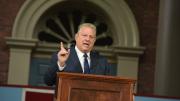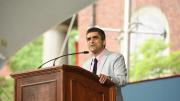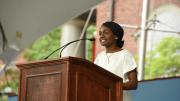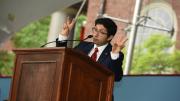Class Day speeches are often a time for congratulations and applause. Messages are delivered lightly and with humor. Commencement is, after all, a time for celebration.
But after a few jokes, Harvard College’s Class Day speaker, Al Gore ’69, LL.D. ’94, did not hold back during his time in Tercentenary Theatre, delivering an analysis on the current state of affairs, a history lesson, and a call to action in under 30 fiery minutes. Gore allowed few pauses for applause, and when the crowd did choose to stand—as many did when he implored Harvard University to divest from fossil fuels—he beckoned them to sit back down, not wanting to relinquish a continually building sense of urgency.
“Veritas—truth—is not only Harvard’s motto emblazoned on so many of these banners here today,” Gore began. “But it is also democracy's shield, and the right to pursue truth is the most fundamental right of them all. That right is now at risk. And as a result, freedom itself is at risk.”
But as truth is questioned more, he said, its importance to democracy becomes clearer. “The belief that free citizens can govern themselves wisely and fairly by resorting to logical debate on the basis of the best evidence available instead of on the basis of the exercise of raw power was and remains the simple premise of American democracy,” Gore said. As he sees it, this premise is under constant assault.
The alternative to democracy throughout history, he continued, has been the consolidation of power in the hands of a single strongman, who enlists a small group of henchmen to exercise power without the informed consent of the governed. America, Gore said, was founded in revolt against such a system. During the Civil War, Lincoln acknowledged again the rarity and fragility of democracies. “And they often do not last,” Gore said. “And when they do fail, as they did in Athens and the Roman Republic…what emerges in their place is another strongman. A dictator, as the Romans called him.” Totalitarians, Gore warned, “seek to make themselves both above the law and the sole arbiter of truth.”
Though Gore never named President Donald Trump, his references to his administration as an antagonist for truth were hardly veiled. “Supporters of authoritarianism define loyalty to America’s core principles as treason against its new would-be sovereign,” Gore said, alluding to the Trump administration’s reference to the press as “enemies of the people.” A desire for more power “explains the appeal to would-be autocrats of multiple ‘bromances’ with extreme authoritarians—at least one of whom in our current time has been allowed to sink his teeth into America’s democratic electoral process and play with it like a chew toy.” When reason and logic are removed from public discourse, Gore warned, authoritarians can run rampant. When they erode the concept of truth, they can propagate any information they want to suit a given agenda. “Then all the questions before us are reduced to a simple question: who can exercise the most power in its rawest form?”
Despite the unrelenting heaviness of Gore’s words, he was careful to warn the Class of 2019 against displaying an attitude of cynicism as they look to confront contemporary issues—especially climate change, a marquee subject for Gore. Cynicism can’t stop record-setting levels of flooding that affect tens of millions of Americans, nor can it stop the “110 million tons of man-made heat-trapping global warming pollution” that humans pump into the sky “every day as if it is an open sewer.”
“Authoritarianism is now not only a threat to democracy in America,” he said. “Now, because of the attacks on climate science, it has become a threat to the survival of human civilization as we know it, and even potentially to the capacity of the human species to endure.”
Gore implored graduates to not sit back and accept what’s happening to the country as a given. “I’m here in response to your invitation, grateful for the opportunity to speak with you,” Gore said, his voice rising in volume. “But I am also here to recruit you. We have work to do, all of us.” Pushing toward his conclusion, Gore compared the strategies employed by the fossil-fuel industry—to mislead the public and cause widespread doubt in scientific consensus—to those employed by the tobacco industry, which Harvard divested from in 1990. “Why would Harvard University continue to support with its finances an industry like this that is in the process of threatening the future?” Gore practically shouted, to the biggest applause for the speech to that point.
“We have to change, but we can change. We have the ability to change. And the obstacles to change can be overcome,” Gore concluded. “But it will require a decision on the part of you, in this graduating class, and all of those who are part of your networks of family and friends, to decide that it is important enough to do….I refuse to believe that we as human beings do not have a sufficient capacity to make changes of the magnitude that are now necessary to save our future. And if you doubt for one moment that we have the ability to change or the will to change, please always remember that the will to change is itself a renewable resource.”












